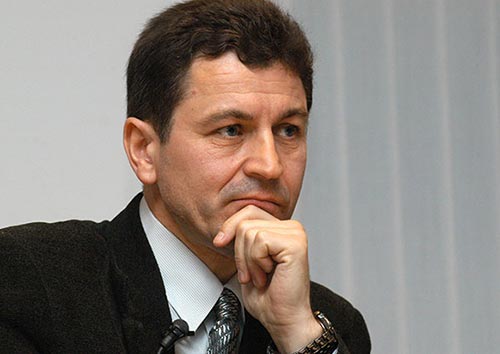[vc_row][vc_column][vc_column_text]

Grigory Pasko, was named Whistleblower of the Year at the 2001 Freedom of Expression Awards.
Grigory Pasko, a former naval officer and journalist for Russian Pacific Fleet newspaper Boyevaya Vakhta (Battle Watch), was imprisoned in 1997 after exposing Russia’s navy for illegally dumping nuclear waste in the Sea of Japan. He was arrested on charges of espionage and abuse of his official power as a former officer in the Russian navy.
Pasko was the winner of Index on Censorship’s International Whistleblower of the Year award in 2001.
Pasko spent 20 months in prison awaiting his first trial, and on 20 July 1999 he was acquitted of most of the charges. However, he was sentenced to three years in prison for abusing his authority as a naval officer. Pasko was finally released from prison under an amnesty in January 2003.
Although Russia’s 1990 Law on the Mass Media [1991] states that journalists are allowed to carry on investigations and Article 29 of the Russian Constitution bans censorship altogether, journalists are often persecuted for their work and subject to governmental harassment.
In March 2011, Pasko, along with his colleagues Igor Korolkov and Galina Sidorova, created an international NGO called the Community of Investigative Journalists – Foundation 19/29. The numbers 19 and 29 refer to the freedom of expression Articles of the Universal Declaration of Human Rights and the Russian Constitution.
Foundation 19/29 was created to provide guidance and assistance to Russian investigative reporters and bloggers who are in trouble due to their work and/or want to develop their professional skills.
Since his release from jail, Pasko has been campaigning for human rights and protection of the environment.
Index: How much more difficult is it now to be an informant than 16 years ago when you won the Index for Censorship International Whistleblower?
Pasko: The word “difficult” is no longer suitable. It is practically impossible without being detected and not “registered”. “To put on the register” means that suddenly there can be some difficulties: with obtaining a passport (as now at Dadin); with departure abroad; allegedly with non-payment of fines, taxes and so on; it can come with an apartment search or arrest (Mark Halperin recently) … Previously, this happened very rarely.
Index: What major projects are you currently working on and how does this differ from your work when you won the Index Awards?
Pasko: Since 2009, I have been engaged in teaching activities in the field of investigative journalism – journalists are, in fact, banned in Russia. Therefore, I am persecuted in all cities of Russia and in Moscow. I’m being squeezed out of the country, not giving me the opportunity to work. Our organization – Fund 19/29 http://foundation19-29.com/ was recognized as a “foreign agent” so that we had to stop our activities. Now there is a Fund 19/29, but already in Prague. In the same place, we conduct our training activities. In general, almost all independent NGOs are subject to harassment in Russia.
Index: How do you think the Russian government manages the information landscape? How does social media play a certain role in this?
Pasko: The Russian government (FSB, mostly) almost completely manages the information landscape. Those media and their blogs that still exist, for sure (if they are smart and sober) do not consider themselves independent, because they can be closed within a day. They are just allowed to exist. Social networks are relatively free so far. But they also gradually fall under the total dependence of the state (FSB). So the other day it happened with LiveJournal.
Index: What do you think, what will be the future for journalists in Russia?
Pasko: Independents will be persecuted, squeezed out of Russia, and those who remain will be imprisoned and / or killed. Independent journalism will not remain in the legal and free field. Only underground, in networks. The angry propaganda will occupy the entire information field.
Index: How did your attack in Siberia in September 2016 affect you?
Pasko: Personally, it did not. After two convictions and two imprisonments, I can only be killed, but not scared. But our partners in the regions were frightened and less likely to invite us to conduct studies on investigative journalism, despite the fact that there is a demand among young journalists, civil journalists and bloggers for this genre.
Index: Do you have any advice for other investigative journalists and informers working under a dangerously authoritarian regime?
Pasko: Be careful. Because no work should cost a human life. And, strangely enough, be bold – in the mass of its leadership of Russia (Chekists) are not only deceitful, but also cowardly. We need to learn to resist them – from the standpoint of legality, justice, respect for human rights and generally common sense. Journalism is a wonderful and necessary profession, and it deserves to be fought for by the journalists themselves.[/vc_column_text][/vc_column][/vc_row][vc_row][vc_column width=”1/2″][vc_single_image image=”85476″ img_size=”full” alignment=”center” onclick=”custom_link” link=”https://www.indexoncensorship.org/2016/11/awards-2017/”][/vc_column][vc_column width=”1/2″][vc_column_text]
Index on Censorship Freedom of Expression Awards
Seventeen years of celebrating the courage and creativity of some of the world’s greatest journalists, artists, campaigners and digital activists
2001 | 2002 | 2003 | 2004 | 2005 | 2006 | 2007 | 2008 | 2009 | 2010 | 2011 | 2012 | 2013 | 2014 | 2015 | 2016 | 2017[/vc_column_text][/vc_column][/vc_row][vc_row][vc_column][vc_basic_grid post_type=”post” max_items=”12″ style=”load-more” items_per_page=”4″ element_width=”6″ grid_id=”vc_gid:1492505147907-f0c495c9-a9a4-0″ taxonomies=”2650, 15″][/vc_column][/vc_row]




